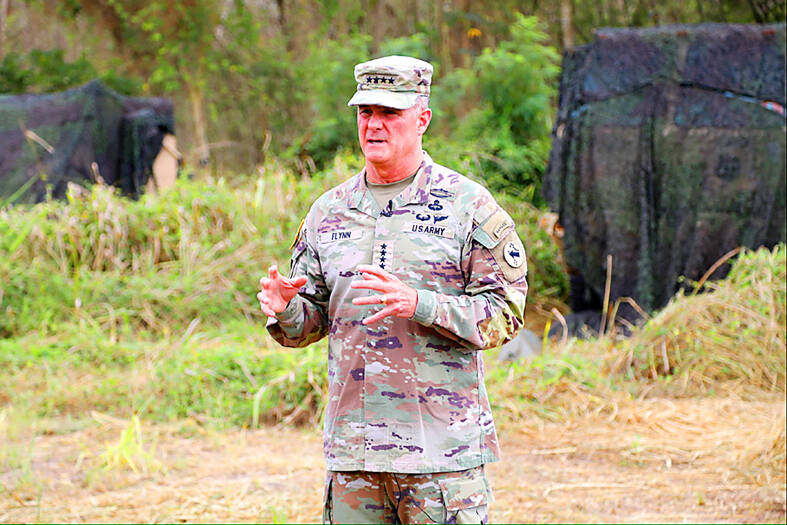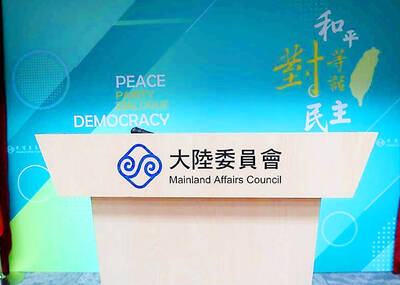The US is to deploy newly developed missiles to the Indo-Pacific region this year with additional types planned for later, a top US commander told a news conference at the US embassy in Tokyo on Wednesday.
“I am not going to discuss what system and I am not going to say where and when,” General Charles A. Flynn, commander of the US Army Pacific, was quoted by Stars and Stripes as saying at the event. “I am just saying there will be a long-range precision fire capability.”
Deployment of land-based medium-range missiles that are capable of being armed with nuclear warheads in the region would be a first for Washington since it suspended the Intermediate-Range Nuclear Forces Treaty in 2019.

Photo: AFP / US Army
Previously, Flynn told reporters at the Halifax International Security Forum in Canada that the US would deploy a limited number of Tomahawk missiles and Standard Missile-6 (SM-6) to the region, Defense One said in a report on Nov. 19 last year.
The US Army’s new land-based Tomahawk cruise missiles have a range of more than 2,400km and can be utilized to strike ground and sea targets.
In Tokyo, Flynn was cited as mentioning the Typhoon launcher, a system being developed for the two missile types, saying that it would have a “hypersonic capability.”
“I am not going to say where or when we will deploy in 2024,” Flynn said. “There are actually multiple systems in development.”
He also spoke about the Precision Strike Missile, a long-range anti-ship weapon expected to reach initial operational capabilities by the end of the year.
According to Lockheed Martin, the missile can engage targets at ranges beyond 499km.
Washington does not deem it necessary to sign new agreements with other countries to deploy medium-range missiles, Flynn said, adding that the US Army already deploys High Mobility Artillery Rocket Systems in the region.
Separately, the Financial Times reported on Thursday that Tokyo and Manila have discussed deploying Japan Self-Defense Forces in the Philippines as the countries verge on several security pacts aimed at augmenting the region’s defense against China.
Philippine Ambassador to the US Jose Manuel Romualdez was cited as saying that Manila and Tokyo were close to inking a “reciprocal access agreement,” which would allow their militaries to train and conduct drills on each other’s territory.
The two countries additionally made plans to deploy troops on a rotation, similar to the arrangement that enabled the US to maintain a continuous presence in the Philippines, despite the latter’s constitutional prohibition against permanent basing of foreign troops, he said.
Japan and the Philippines are anticipated to ink the reciprocal access agreement shortly after their heads of state attend a trilateral meeting hosted by US President Joe Biden, he said.

Taiwan Semiconductor Manufacturing Co (TSMC, 台積電) on Wednesday said that a new chip manufacturing technology called “A16” is to enter production in the second half of 2026, setting up a showdown with longtime rival Intel over who can make the fastest chips. TSMC, the world’s biggest contract manufacturer of advanced computing chips and a key supplier to Nvidia and Apple, announced the news at a conference in Santa Clara, California, where TSMC executives said that makers of artificial intelligence (AI) chips will likely be the first adopters of the technology rather than a smartphone maker. Analysts said that the technologies announced on

A total of 41 US military personnel were stationed in Taiwan as of December last year, a US congressional report said on Friday last week ahead of Tuesday’s passage of an aid package that included US$8 billion for Taiwan. The Congressional Research Service in a report titled Taiwan Defense Issues for Congress said that according to the US Department of Defense’s Defense Manpower Data Center, 41 US military personnel were assigned for duty in Taiwan. Although the normalization of relations with the People’s Republic of China (PRC) in 1979 included a vow to withdraw a military presence from Taiwan, “observers have indicated

NO RECIPROCITY: Taipei has called for cross-strait group travel to resume fully, but Beijing is only allowing people from its Fujian Province to travel to Matsu, the MAC said The Mainland Affairs Council (MAC) yesterday criticized an announcement by the Chinese Ministry of Culture and Tourism that it would lift a travel ban to Taiwan only for residents of China’s Fujian Province, saying that the policy does not meet the principles of reciprocity and openness. Chinese Deputy Minister of Culture and Tourism Rao Quan (饒權) yesterday morning told a delegation of Chinese Nationalist Party (KMT) lawmakers in a meeting in Beijing that the ministry would first allow Fujian residents to visit Lienchiang County (Matsu), adding that they would be able to travel to Taiwan proper directly once express ferry

CALL FOR DIALOGUE: The president-elect urged Beijing to engage with Taiwan’s ‘democratically elected and legitimate government’ to promote peace President-elect William Lai (賴清德) yesterday named the new heads of security and cross-strait affairs to take office after his inauguration on May 20, including National Security Council (NSC) Secretary-General Wellington Koo (顧立雄) to be the new defense minister and former Taichung mayor Lin Chia-lung (林佳龍) as minister of foreign affairs. While Koo is to head the Ministry of National Defense and presidential aide Lin is to take over as minister of foreign affairs, Tsai Ming-yen (蔡明彥) would be retained as the nation’s intelligence chief, continuing to serve as director-general of the National Security Bureau, Lai told a news conference in Taipei. Koo,